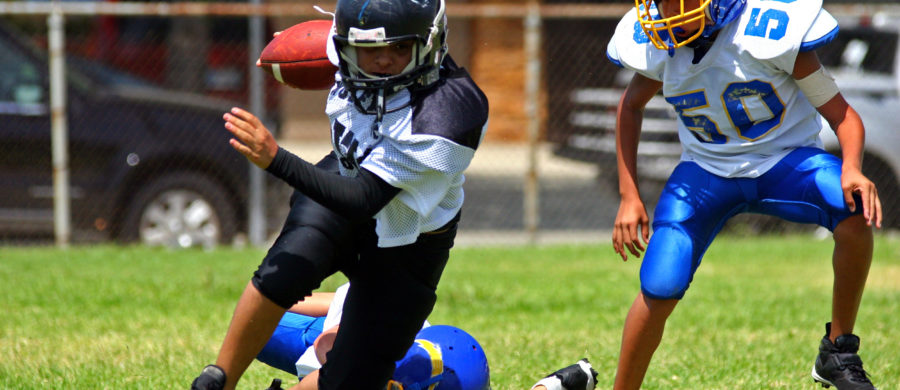Dr. Geiger on Concussions
Please welcome Dr. Kristen Geiger to “Ask a Doctor.” Dr. Geiger is a board-certified pediatrician and non-surgical pediatric sports medicine specialist. She is answering questions about concussions in young athletes — how do they differ from similar injuries in adults, what symptoms should parents and coaches look for, and how are they treated?
What is a concussion?
Dr. Geiger: Concussions are characterized as a bruise on the brain. Typically, unless there is something specific like bleeding or pressure on the brain, a concussion cannot be seen through imaging such as MRI or CT Scans. If a concussion is suspected, we don’t routinely order an image unless something we see during an examination makes us concerned about possible pressure or bleeding.
How do concussions in children and teens differ from adults?
Dr. Geiger: Concussions in young athletes take longer to heal than with adults. The younger a person is, the more neuro-synapses in the brain need to be put back together after a concussion injury, hence a longer healing time.
What trends are you seeing with concussion awareness in youth sports?
Dr. Geiger: Parents are more aware about concussions because of recent media coverage. As a result, parents and coaches are taking concussions much more seriously than in the past.
As a community, we have a better understanding about what is necessary for a young athlete to recover after a concussion. We know more about the importance of both general and academic rest in the healing process. Also, the need for a multi-step return back to sports and academics is more accepted now.
I am also seeing more understanding about the emotional component associated with concussions. Concussions in young athletes can be challenging to treat because there are usually no outward signs of injury; there is no bandage, for instance. The athlete looks normal but requires special accommodations – they may not be able to tolerate attending school all day or they might need to limit time with friends or their team while recovering.
What sports have the highest risk for concussion?
Dr. Geiger: Athletes in almost any sport can suffer a concussion injury. Among high school athletes, concussions are most often caused by contact with an opponent or a collision with an object such as the goalpost or ground. When soccer players get concussions, for example, it’s usually not from intentionally heading the ball, but from head-to-object impact — such as with another player. Concussions can also happen when the head jerks in a “whiplash” movement.
What are the symptoms of a concussion?
Dr. Geiger: After a traumatic event, a concussion patient may report one or more of these symptoms:
- Headache
- Dizziness
- A ‘Foggy’ Feeling
- Nausea
- Vomiting
- Balance Problems
- Feeling More Emotional than Usual
- Sensitivity to Light and Sound
Parents and coaches can also look for changes in behavior, irritability, slow to respond in conversation, repetitive questions, sleep disturbances (too much or difficulty sleeping), and intolerance to normal situations. Remember, the signs and symptoms can be absent at the time of injury and may appear days after the concussion.
How are concussions treated?
Dr. Geiger: It’s important to take your child to an emergency room immediately if they are experiencing any of these symptoms:
- Loss of consciousness
- Bleeding from the ears
- Inability to move and feel arms and legs normally
- Repeated vomiting
- Increasing symptoms instead of improving
- Also, don’t hesitate to visit an emergency room if you are unsure about your child’s symptoms and need reassurance
If none of these situations is present, take your child home and start this concussion treatment protocol:
- Keep the child’s activities limited and take it very easy, even including power naps during the day
- Avoid mental activities including TV, movies, computers, video games, phones (unless used for talking), texting, puzzles, fine details crafts and reading.
- Limit physical activities including running, biking, swimming, ball sports, and playgrounds.
- Engage your child in activities such as audiobooks, quiet music and talking on the phone
As symptoms improve, activities can increase. It also is a good idea to check in with your pediatrician by phone or during a normal office visit.
How can young athletes prevent concussions?
Dr. Geiger: It’s important for coaches and parents to encourage “smart play”. If you’re a soccer player and see two people running to hit a ball, you really don’t need to be the third person going for it. That’s how you’re going to get hurt – not by hitting the ball but by being hit by the other two people.
It’s also important to always wear the appropriate protective gear for your sport and wear it properly.
Coaches and parents should teach young athletes to play by the rules. Many rules in sports are present to prevent injuries.
Using good technique can also help prevent concussions. For instance, swimmers can be injured when they miss the wall and hit their head. The small act of knowing their stroke count after passing under the pool flag can prevent accidents that cause concussions.
What is ImPACT Baseline Concussion Testing?
Dr. Geiger: ImPACT testing for concussion is a nationally-recognized computerized test that measures cognitive skills. Taking the test before the athletic season begins is an important step to being prepared if a concussion injury should happen.
The test measures verbal capabilities, visual memory, reaction time and processing speed. If a concussion is suspected, post-injury testing is an important piece of the puzzle when determining severity of the injury and treatment.
Having tangible test results after a concussion can also help with the recovery process. Every kid wants to keep playing and seeing physical evidence from the ImPACT test can help them choose to slow down if they have not returned to their pretest performance. It can also help determine when the teenagers are safe to return to driving.
We recommend ImPACT testing for athletes that are involved in sports where contact with other players and/or falls are common or inevitable.
Dr. Geiger practices at Boulder Medical Center – Foothills
Phone: (303) 938-4750
Address: 4745 Arapahoe Avenue in Boulder


